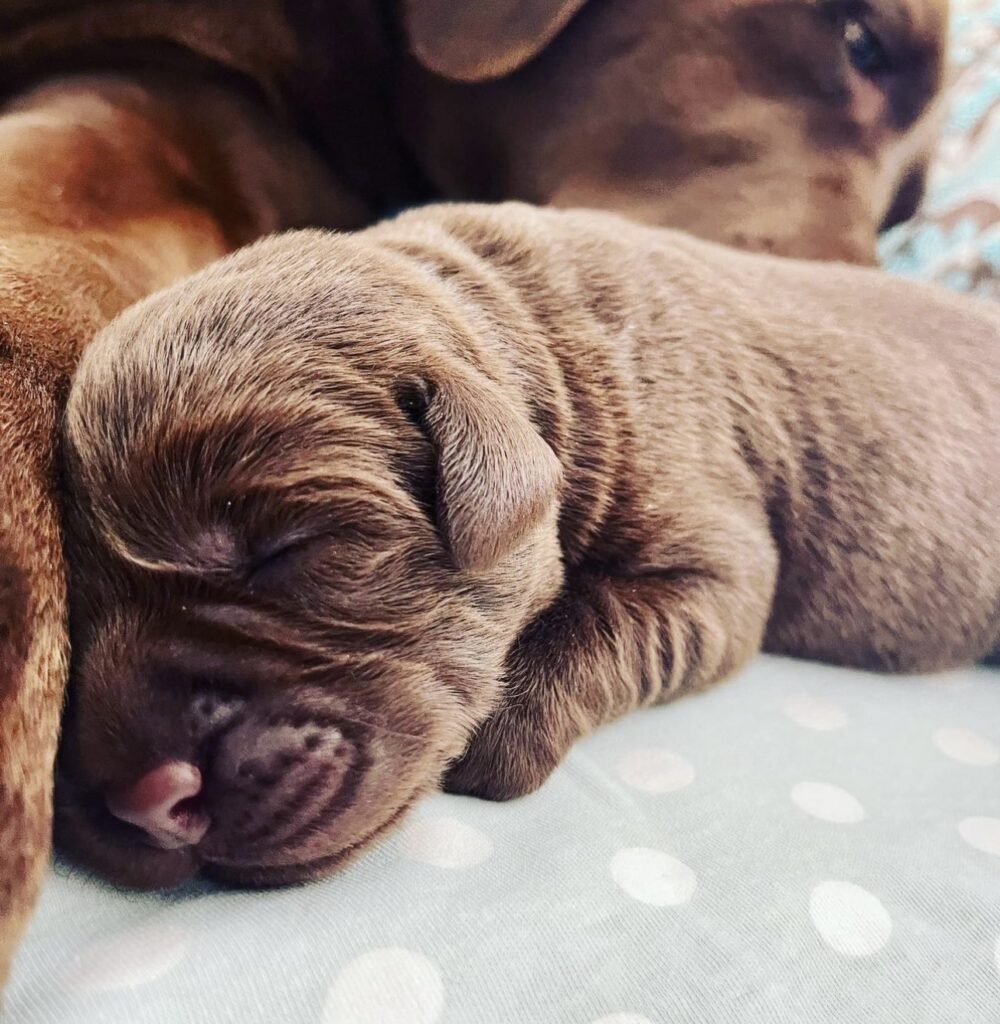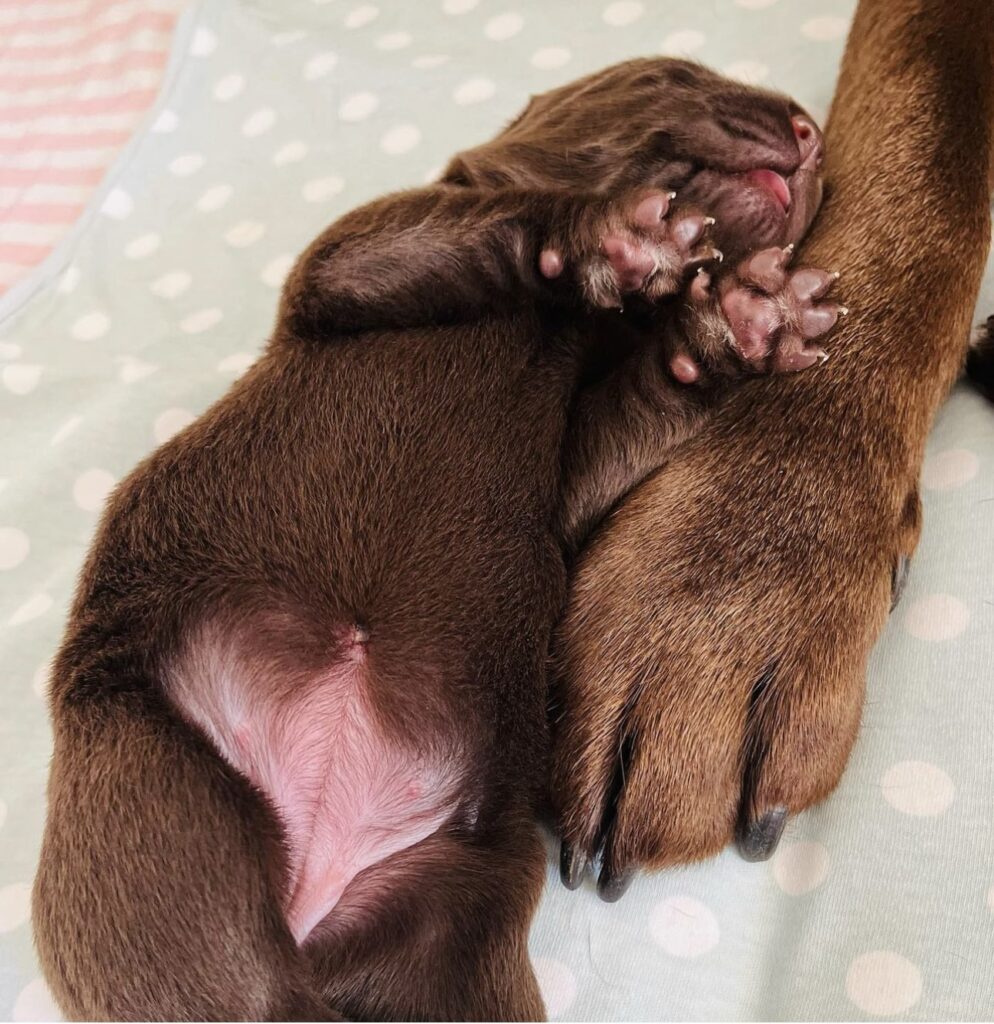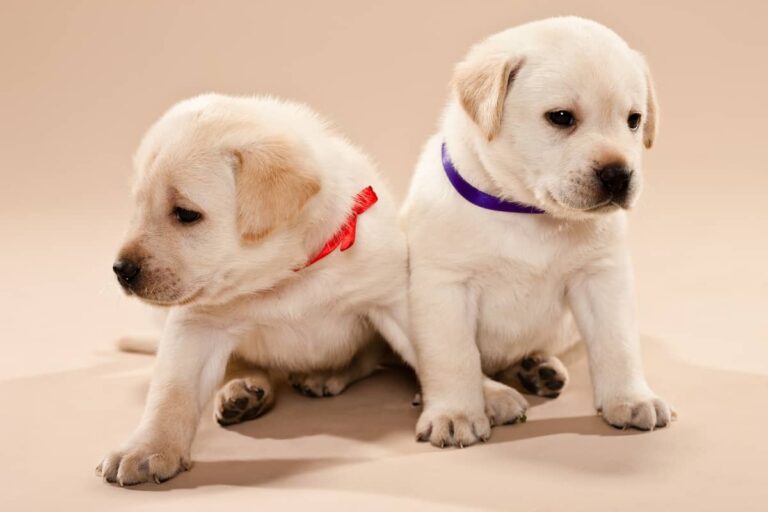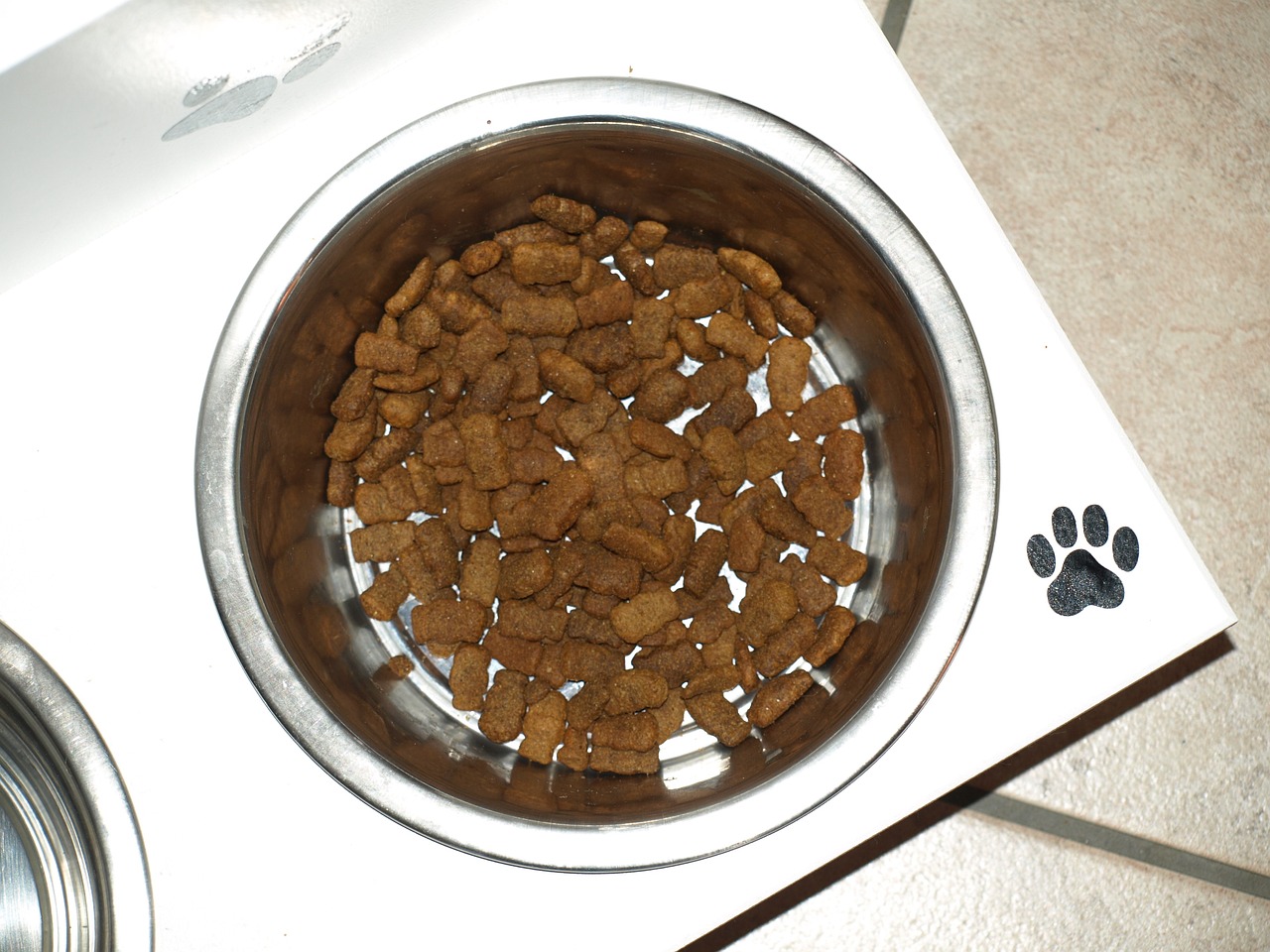When Do Labrador Puppies Open Their Eyes?
If you’re a dog lover, Labrador puppies are one of the cutest breeds around. And it’s not just their soft fur and round bellies that make them adorable – their big, beautiful eyes pull at our heartstrings. Did you know that most puppies are born with their eyes closed? It’s a natural defense mechanism that protects their delicate retinas while they develop in the womb.
But when do Labrador puppies open their eyes, and what does that mean for their development? It’s a question that often pops up among new owners, and we’re here to give you the answer. But it’s not just a matter of the right age – there’s a lot more to it than that. From genetics to the environment, several factors come into play regarding this crucial step in a puppy’s development.
And that’s what we will explore in this blog – everything you need to know about when and how Labrador puppies open their eyes.
Early Life of Labrador Puppies

Well, let’s start at the beginning. When Labrador puppies are born, they are tiny and helpless. They can’t see, hear, or even regulate their body temperature. But despite their vulnerability, they are incredibly resilient. They are born with a set of instincts that help them survive in those critical first few weeks of life.
One of the most interesting things about newborn Labrador puppies is their closed-eye phase. Their eyes are completely closed for the first ten to twelve days of their life. This may seem odd, but it serves an important purpose. During this time, the puppies rely heavily on their sense of smell and touch to navigate their environment and locate their mother. By keeping their eyes closed, they can better focus on developing these other senses.
So what do Labrador puppies do during this closed-eye phase? Well, mostly, they sleep and eat. In fact, for the first few days of their life, they will spend almost all of their time sleeping and nursing. This is because they need to consume large amounts of milk to grow and develop. In fact, Labrador puppies will often double their birth weight within the first week of their life!
Eye Opening Phase
Typically, Labrador puppies open their eyes when they’re between 12 to 14 days old. This timeline can vary depending on the individual puppy’s genetics and environment. For example, if the litter was born slightly premature, its eyes might open later than the expected timeline. On the other hand, if the Labrador Retriever puppy is exposed to a lot of light or visual stimuli, their eyes might open earlier than average.
The process of eye-opening in Labrador Retriever puppies is gradual and can take several hours or even days. It begins with the puppies’ eyes appearing as small slits, and as time passes, the slits become wider, revealing the pup’s dazzling, curious little eyes. During this phase, the puppies might still have some difficulty focusing, but their eyesight rapidly improves over the next few days and weeks.
It’s important to note that not all puppies open their eyes simultaneously. Some puppies might open their eyes earlier, while others might take a few more days. This is because the timeline varies from pup to pup, depending on their genetics and environmental factors.
Post Eye-Opening Development

Alongside sight and hearing, a Lab puppy’s sense of smell continues to refine. From birth, puppies heavily rely on their noses to find their mom and siblings. As they grow, this sense of smell only becomes more acute, aiding them in exploring their environment and recognizing their human family.
Now, let’s talk about visual adaptation. When puppies first open their eyes, their vision is quite blurry. They can’t see far, and their ability to focus isn’t fully developed. But don’t worry; this changes pretty quickly! By the time they’re about four weeks old, puppies start to see much more clearly. They begin recognizing people and objects, exploring their surroundings more confidently, and engaging in playful behavior with their siblings.
It’s important to remember that puppies’ eyes are still very sensitive during this stage. Bright lights can be harsh, so keeping their environment softly lit is best. And always handle puppies gently, as they’re still adjusting to their new senses.
Factors Impacting Eye Opening
The eye-opening process in Labrador puppies is a crucial stage in their growth and development. Various factors can influence this process:
👀 Genetic Factors
Genetics play a significant role in the timing of when Labrador puppies open their eyes. Puppies inherit genes from both parents, which dictate their developmental timeline. Some puppies might open their eyes a bit earlier or later due to their unique genetic makeup.
👀 Health and Nutrition
The puppies’ overall health and nutritional status can also impact the eye-opening process. Healthy and well-fed puppies are likely to develop on schedule, while those facing health issues or malnourishment may experience delays.
👀 Environmental Conditions
The environment where the puppies are kept can also influence their development. Ideal conditions include a warm, safe, and quiet space. Stressful environments may potentially delay the opening of the eyes.
👀 Mother’s Health During Pregnancy
The mother’s health during pregnancy can impact the development of the puppies. If the mother was healthy and well-nourished during pregnancy, the puppies are more likely to develop normally.
👀 Litter Size
Litter size can also play a role. Competition for resources can sometimes lead to slower development for some puppies in a larger litter.
Potential Issues and Solutions
As a pet owner, it’s important to understand the eye-opening process of Labrador puppies so you can watch for any potential issues. Let’s dive into what these could be and some solutions.
✅ Delayed Eye Opening
If your Labrador puppy’s eyes haven’t opened by 14 days, it could indicate a possible issue. This delay might be due to an infection, malnutrition, or a developmental problem. The solution here is to consult with a vet who can diagnose the issue and provide appropriate treatment.
✅ Infections
Sometimes, a puppy’s eyes might become infected before they open completely. While this is rare, it’s essential to watch out for any signs of swelling, redness, or discharge. If noticed, seek veterinary care promptly. The vet might prescribe antibiotic eye drops or ointment to clear up the infection.
✅ Eye Abnormalities
In some rare cases, puppies might be born with certain eye abnormalities like microphthalmia (small eyes) or anophthalmia (absence of one or both eyes). A vet should examine the Labrador pup immediately if you suspect any such issues.
✅ Forced Eye Opening
Never attempt to force open a puppy’s eyes. Their eyes will open naturally when they are ready. Forcing them open can cause serious harm. If you’re concerned about the timing, it’s best to consult a vet.
Remember, while these potential issues can be concerning, they are rare. Most Labrador puppies will open their eyes without any problems between 12 to 14 days after birth. It’s always a good idea to keep an eye on their development and consult with a vet if you have any concerns. After all, these little furballs depend on us to ensure they grow up healthy and strong!
Frequently Asked Questions
Q: When can I feed my newborn puppy dog food?
According to the American Kennel Club, feeding puppies a diet of high-quality puppy food is recommended until they’re about 3 – 4 weeks old. It’s essential to note that puppies have different nutritional needs than adult dogs, which is why it’s important to provide them with specially formulated puppy food. This type of food contains the right balance of protein, fat, and nutrients that puppies need to develop healthy brains, muscles, and bones. Always choose a reputable brand and consult your veterinarian for personalized advice on feeding your newborn Labrador puppy.
Q: Do all Retriever dog breed puppies open their eyes at the same time?
While it varies from pup to pup, in general, puppies of these breeds will usually start to open their eyes around 12-14 days old. However, it’s important to remember that every pup is unique and may develop independently. Additionally, there are some differences between the American Labrador and English Labrador breeds, with English Labs often having somewhat more squinty eyes. Just like with human babies, this exciting milestone isn’t always a perfectly coordinated event, but rest assured that your little furball will soon be taking in the world around them with a clear vision.
Q: What eye color do a black Labrador, a yellow lab, and a chocolate lab have?
Black Labrador puppies typically have brown or dark-brown eyes at birth, which may change to a lighter shade as they get older. Yellow Labradors usually have medium-brown colored eyes that will also likely lighten with age. And Chocolate Labs tend to be born with the darkest eye color of all – deep amber, mahogany, or hazelnut!
Q: Do I need pet health insurance for my Lab pup?
While it’s not a requirement, having pet health insurance for your Lab pup can be a great way to ensure they receive the care they need throughout their life. Like humans, pets can suffer from a range of health issues, from dental disease and heart disease to liver disease and beyond. And as a puppy, your furry friend will require special attention to their teeth as they begin to lose their puppy teeth and grow their adult teeth. So, before you say “no thanks” to pet health insurance, consider how it might give you peace of mind and help you take better care of your beloved Lab pup.
Q: What routine care do I need to provide for my Labrador puppy?
You’ll need to provide your Lab pup with regular checkups, vaccinations, and parasite prevention. Additionally, you should make sure they’re on a healthy diet and get plenty of exercise. Finally, the AKC recommends brushing their teeth daily and trimming their nails at least once a month. Taking care of your pup’s physical and mental health is important, so never forget to show them lots of love too! With proper care and plenty of playtime, your Lab will remain healthy and happy for years to come
Final Words
It is always a joyous moment for any dog lover to witness the tiny squinty eyes of a Labrador puppy slowly open for the first time. And the best part? It happens within the first two weeks of their life! While this might seem like a small milestone, it is a sign of good health and a promising future for your furry companion. So, make sure to cherish these precious moments and appreciate the wonder of nature that allows us to witness such miraculous events. As your puppy’s eyes develop and grow, give them all the love and care they need to live a happy and healthy life. Here’s to many more bright-eyed and bushy-tailed moments with your beloved Labrador pup!








